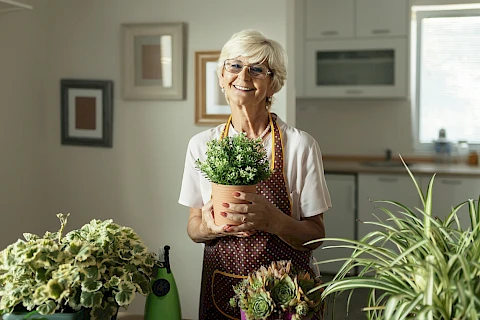
Indoor gardening can be a rewarding and therapeutic activity for the seniors in your care, and caregivers can play a key role in facilitating this. Senior Helpers will provide tips for setting up and maintaining an indoor garden, discuss the benefits of gardening for mental and physical well-being, and offer ideas for involving seniors in the process.
Benefits of Indoor Gardening for Seniors
Indoor gardening offers several benefits for seniors, making it an ideal activity for improving overall well-being. Gardening can positively impact mental health by reducing stress and anxiety and providing a peaceful and calming environment. Many seniors find that gardening enhances their mood and emotional well-being, offering a sense of accomplishment and purpose.
In terms of physical health, indoor gardening activities like planting and watering plants can improve motor skills and coordination. These light physical activities help keep seniors active without causing strain or fatigue. Of course, seniors should always consult with a doctor before starting a new fitness routine.
Additionally, gardening stimulates the mind, requiring planning, problem-solving, and attention to detail, which can enhance memory and focus. For seniors experiencing cognitive decline, these mental exercises are especially valuable.
Tips for Setting Up an Indoor Garden
Indoor gardening for seniors can be simple and enjoyable with the right approach. When choosing plants, select those that are easy to care for and have sensory appeal. Herbs like basil and mint are low-maintenance and fragrant, while flowers such as African violets or peace lilies add beauty and are relatively easy to grow.
Ensure the garden space has adequate lighting, with natural light from windows being the best option, though grow lights can also work. Proper ventilation is important to keep plants healthy, so ensure there is good air circulation in the gardening area.
Gather essential tools and supplies to make gardening easier for seniors. Pots and containers of various sizes are necessary for different types of plants, while quality soil and fertilizers will help them thrive.
Maintaining an Indoor Garden
Once the indoor garden is set up, consistent care will keep it flourishing. Most plants need regular watering, but it's important not to overwater. Check the soil moisture before watering and feed plants with appropriate fertilizers according to their needs.
Watch out for signs of common issues like pests or nutrient deficiencies. Yellowing leaves or wilting can indicate these problems. Simple solutions, like adjusting watering habits or adding a plant-safe pesticide, can resolve many issues. It is also important to adjust the care routine with the seasons. During winter, plants may need less water and more light, while in summer, they might require extra watering.
Involving Seniors in the Gardening Process
Engaging seniors in the indoor gardening process makes it more enjoyable and rewarding. Assign tasks that match their abilities, such as planting seeds, watering, and light pruning. These activities provide a sense of accomplishment without being overwhelming.
Encourage creativity by allowing seniors to decorate pots and arrange plants as they like. This personalizes their space and also boosts their creativity and sense of ownership. Indoor gardening can also be a social activity. Group gardening sessions or clubs can provide social interaction and foster community bonds. Sharing gardening experiences can be a delightful way to connect with others.
Let Us Help You Set Up Your Indoor Garden
Indoor gardening offers numerous benefits for seniors, from improving mental and physical health to providing an engaging hobby. An indoor garden can be a source of joy and well-being with the right setup and maintenance.
Start an indoor garden today and experience the therapeutic benefits it offers! For more senior support and resources, click here to find a location near you and learn more about Senior Helpers.

